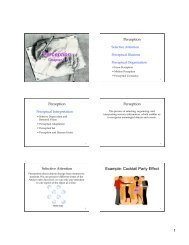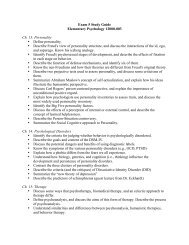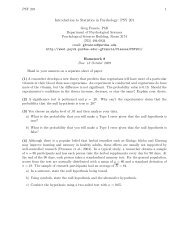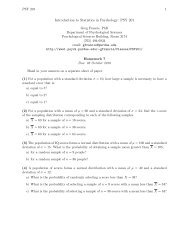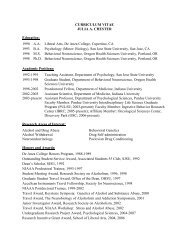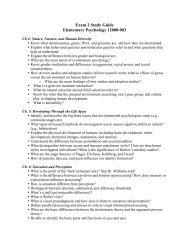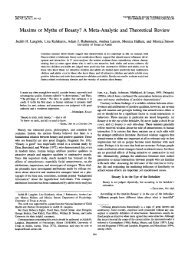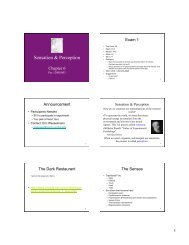Social Psychology in Film - Psychological Sciences
Social Psychology in Film - Psychological Sciences
Social Psychology in Film - Psychological Sciences
Create successful ePaper yourself
Turn your PDF publications into a flip-book with our unique Google optimized e-Paper software.
Williams—Psy 392F - <strong>Social</strong> <strong>Psychology</strong> <strong>in</strong> <strong>Film</strong> 3<br />
How to Write Your 2-Page Thought Papers<br />
I realize that 500 words may seem unreasonably restrict<strong>in</strong>g to you, prevent<strong>in</strong>g you from adequately express<strong>in</strong>g your<br />
ideas. In scientific journals, psychology <strong>in</strong>cluded, writ<strong>in</strong>g is necessarily concise. Specific page restrictions are enforced.<br />
Redundancy, flowery writ<strong>in</strong>g, and ambiguity are to be edited out. This is a difficult exercise. Your first draft for each<br />
paper will probably be 3-4 pages long, so your subsequent draft(s) will <strong>in</strong>volve edit<strong>in</strong>g your paper down to size. (If, on<br />
the other hand, you’re hav<strong>in</strong>g a difficult time com<strong>in</strong>g up with 500 words, then you may not be putt<strong>in</strong>g enough thought<br />
<strong>in</strong>to your thought papers).<br />
You will then go through a thorough edit<strong>in</strong>g stage. Ask yourself these questions: Is this sentence necessary? Is this word<br />
necessary? Can I comb<strong>in</strong>e these two sentences? Am I stray<strong>in</strong>g from my ma<strong>in</strong> thesis?<br />
1) State your thesis early and explicitly. Underl<strong>in</strong>e it, so I know where it is (or italicize it or put it <strong>in</strong> ALL CAPS).<br />
2) Do not settle for a wishy-washy thesis. Be brave enough to take a stance and argue for it. Avoid the obvious<br />
(i.e., this movie is a perfect example of this phenomenon). I am look<strong>in</strong>g for clever <strong>in</strong>sights, particularly about the<br />
theory (or theories) and/or research (not so much about the film).<br />
3) Select a thesis with a narrow focus. It should be <strong>in</strong> some way an extension of the read<strong>in</strong>g (not the movie).<br />
Critically analyze the read<strong>in</strong>g. Take issue with the theory, the generalizations, or the way the idea was tested. Use<br />
the movie to help come up with your idea or to help illustrate your po<strong>in</strong>t.<br />
4) Do not necessarily select a thesis that is the central focus of the movie or the read<strong>in</strong>g. It could be a tangential<br />
issue that piqued your <strong>in</strong>terest.<br />
5) Support your thesis with persuasive arguments based upon examples from the read<strong>in</strong>g and the movie.<br />
6) Use each paragraph to make a po<strong>in</strong>t that will provide strength to your thesis. The po<strong>in</strong>t should be clear and the<br />
paragraph should be organized around it. Do not write a paragraph that drifts from one po<strong>in</strong>t to another to<br />
another. Just have one po<strong>in</strong>t per paragraph.<br />
7) Avoid quotes, especially long ones.<br />
8) Def<strong>in</strong>e important or esoteric terms. Do not assume I know what you are talk<strong>in</strong>g about.<br />
9) Remember that spell<strong>in</strong>g, grammar, sentence structure and organization ARE important and figure <strong>in</strong>to the<br />
grad<strong>in</strong>g.<br />
10) Do not end your paper with a platitude.<br />
Other tips:<br />
Some students need an <strong>in</strong>troductory sentence or two to get the ball roll<strong>in</strong>g, but these sentences can often be discarded<br />
before submitt<strong>in</strong>g the f<strong>in</strong>al draft.<br />
Often students talk about more than one thesis, which always results <strong>in</strong> a lower grade. There is not enough space to<br />
write and defend more than one thesis with<strong>in</strong> the 500-word limit. Choose your most provocative and well-argued thesis,<br />
and use the entire paper to elaborate upon it.<br />
I cut-and-paste your paper <strong>in</strong>to a word document, and the first th<strong>in</strong>g I do is get a word count. If your paper is over 500<br />
words, I stop read<strong>in</strong>g after I reach the 500 th word. Seriously. So, you should do a word count before submitt<strong>in</strong>g it., and<br />
make sure it is no more than 500 words.





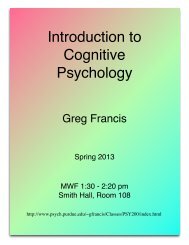
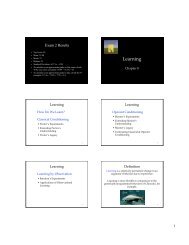
![Exam 4 Study Guide[1]](https://img.yumpu.com/45196739/1/190x245/exam-4-study-guide1.jpg?quality=85)
